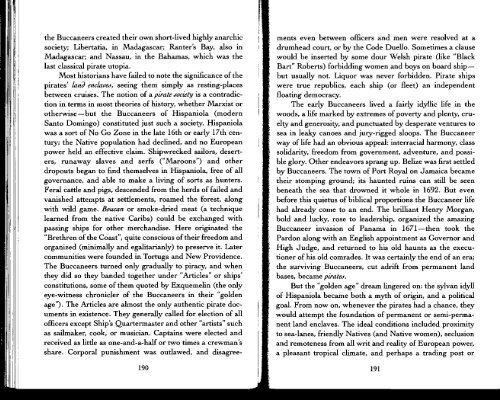Create successful ePaper yourself
Turn your PDF publications into a flip-book with our unique Google optimized e-Paper software.
the Buccaneers created their own short-lived highly anarchic<br />
society; Libertatia, in Madagascar; Ranter's Bay, also in<br />
Madagascar; and Nassau, in the Bahamas, which was the<br />
last classical pirate utopia.<br />
Most historians have failed to note the significance ofthe<br />
pirates' land enclavN, seeing them simply as resting-places<br />
between cruises. The notion of a pirate Jociely is a contradiction<br />
in terms in most theories of history, whether Marxist or<br />
otherwise - but the Buccaneers of Hispaniola (modern<br />
Santo Domingo) constituted just such a society. Hispaniola<br />
was a sort of No Go Zone in the late 16th or early 17th century;<br />
the Native population had declined, and no European<br />
power held an effective claim. Shipwrecked sailors, deserters,<br />
runaway slaves and serfs ("Maroons") and other<br />
dropouts began to find themselves in Hispaniola, free of all<br />
governance, and able to make a living of sorts as hunters.<br />
Feral cattle and pigs, descended from the herds of failed and<br />
vanished attempts at settlements, roamed the forest, along<br />
with wild game. Boucan or smoke-dried meat (a technique<br />
learned from the native Caribs) could be exchanged with<br />
passing ships for other merchandise. Here originated the<br />
"Brethren ofthe Coast", quite conscious oftheir freedom and<br />
organized (minimally and egalitarianly) to preserve it. Later<br />
communities were founded in Tortuga and New Providence.<br />
The Buccaneers turned only gradually to piracy, and when<br />
they did so they banded together under "Articles" or ships'<br />
constitutions, some ofthem quoted by Exquemelin (the only<br />
eye-witness chronicler of the Buccaneers in their "golden<br />
age''). The Articles are almost the only authentic pirate documents<br />
in existence. They generally called for election of all<br />
officers except Ship's Quartermaster and other "artists" such<br />
as sailmaker, cook, or musician. Captains were elected and<br />
received as little as one-and-a-half or two times a crewman's<br />
share. Corporal punishment was outlawed, and disagree<br />
190<br />
ments even between officers and men were resolved at a<br />
drumhead court, or by the Code Duello. Sometimes a clause<br />
would be inserted by some dour Welsh pirate (like "Black<br />
Bart" Roberts) forbidding women and boys on board shipbut<br />
usually not. Liquor was never forbidden. Pirate ships<br />
were true republics, each ship (or fleet) an independent<br />
floating democracy.<br />
The early Buccaneers lived a fairly idyllic life in the<br />
woods, a life marked by extremes ofpoverty and plenty, cruelty<br />
and generosity, and punctuated by desperate ventures to<br />
sea in leaky canoes and jury-rigged sloops. The Buccaneer<br />
way of life had an obvious appeal: interracial harmony, class<br />
solidarity, freedom from government, adventure, and possible<br />
glory. Other endeavors sprang up. Belize was first settled<br />
by Buccaneers. The town of Port Royal on Jamaica became<br />
their stomping ground; its haunted ruins can still be seen<br />
beneath the sea that drowned it whole in 1692. But even<br />
before this quietus of biblical proportions the Buccaneer life<br />
had already come to an end. The brilliant Henry Morgan,<br />
bold and lucky, rose to leadership, organized the amazing<br />
Buccaneer invasion of Panama in 1671-then took the<br />
Pardon along with an English appointment as Governor and<br />
High Judge, and returned to his old haunts as the executioner<br />
of his old comrades. It was certainly the end of an era;<br />
the surviving Buccaneers, cut adrift from permanent land<br />
bases, became piratN.<br />
But the "golden age" dream lingered on: the sylvan idyll<br />
of Hispaniola became both a myth of origin, and a political<br />
goal. From now on, whenever the pirates had a chance, they<br />
would attempt the foundation of permanent or semi-permanent<br />
land enclaves. The ideal conditions included proximity<br />
to sea-lanes, friendly Natives (and Native women), seclusion<br />
and remoteness from all writ and reality of European power,<br />
a pleasant tropical climate, and perhaps a trading post or<br />
191


